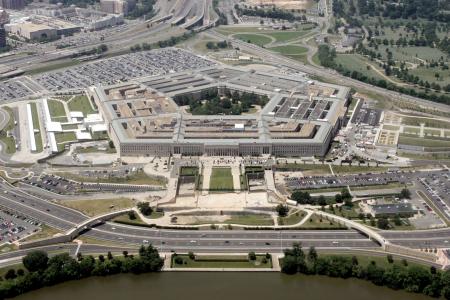The United States views a possibility of an “uncoordinated” Turkish intervention in East of Euphrates as a “grave concern as it would undermine” the both countries’ “shared interest of a secure northeast Syria and the enduring defeat of ISIS” a Pentagon official told Ahval.
“We believe dialogue and coordinated action is the best way to secure the border area in a sustainable manner.” Pentagon spokeswoman Lieutenant Colonel Carla Gleason said in an email responding to Ahval’s questions.
Earlier on Thursday, regarding an impending Turkish operation, an unnamed U.S. official told the Wall Street Journal “it’s a perfect storm, it’s really ugly. There may just be no choice but to leave.”
This quote is probably music to ears of Turkish President Recep Tayyip Erdoğan, who seeks fill the vacuum created by the supposed withdrawal of U.S. forces in the region. Ankara also wants the mentioned withdrawal plans to be orderly.
Last month the United States and Turkey agreed to set up a safe zone in northeast Syria to address Ankara’s security concerns about the Kurdish-led People’s Protection Units (YPG), which have been key to the U.S.-led fight against Islamic State (ISIS).
But progress has snagged due to differences over the scope of the area and U.S. support for Kurdish militias. Turkey sees the YPG as an extension of the outlawed Kurdistan Workers’ Party (PKK), an armed group that has been at war in Turkey for over 30 years. And in recent weeks the Turkish defence minister and Erdoğan have repeatedly threatened to invade the area if Washington is unable to agree to its terms on the safe zone.
Pentagon spokeswoman Gleason did not want to “speculate” whether Turkey would launch a unilateral operation in northeast Syria.
“While the sides continue to refine functional details, our Combined Joint Operations Center in Turkey is operational and the United States is now conducting joint reconnaissance flights and joint patrols with the Turkish military. As planned, the reduction of military fortifications and withdrawal of the YPG from the security mechanism area is underway in accordance with the framework. We will continue to implement the mechanism in a coordinated and collaborative manner,” she said.
Turkey has been deploying military equipment and personnel to its southern border, and Ankara seemingly will not inform Washington early enough in case it mounts an incursion, according to U.S. officials.Turkish Defence Minister Hulusi Akar on Thursday told his U.S. counterpart Mark Esper in a phone call that Ankara would not allow for the formation of a “terror corridor” to its south as indications of a Turkish military operation into northeast Syria mount.
One of Washington’s leading Turkey experts told Ahval that the possibility of Turkish intervention is real and it might even come before the weekend.
Laying out one possible scenario, the expert said a limited incursion accompanied by maximum publicity directed at President Erdoğan’s domestic base “seems like a plausible scenario”.In such a scenario, the Turkish President is not expected to move beyond the 5 km area evacuated by the Syrian Kurdish forces, and it will not be across the entire Euphrates-Iraq borderline.
A limited incursion could do the trick to catch Trump’s attention, bringing him to the bargaining table and get some more concessions, the expert said.
The Pentagon spokeswoman, when asked about the WSJ reports and possibility of the withdrawal of the U.S. forces in case of a Turkish operation, said “for security reasons, we are not going to discuss numbers or timelines but as the President has said, a small residual force of the U.S. military will remain in northeast Syria to prevent an ISIS resurgence, and to support stability and security in northeast Syria.”
“The U.S. and Turkey are working together to rapidly implement the security mechanism and are on time, or ahead of schedule, in many areas. We will continue to implement the plan in designated phases and in a coordinated and collaborative manner,” she said.
Erdoğan was unable to meet with U.S. President Donald Trump during United Nations General Assembly in New York City, although Turkish officials, including Erdoğan himself, talked about a possible face-to-face meeting for weeks before the visit.
Trump in December 2018 abruptly announced the withdrawal of 2,000 U.S. soldiers from Syria, which has left the Syrian Democratic Forces (SDF) and the YPG more exposed to attacks from Turkey and raised questions over who will assume control of Kurdish-held parts of Syria following the U.S. withdrawal.







































admin in: How the Muslim Brotherhood betrayed Saudi Arabia?
Great article with insight ...
https://www.viagrapascherfr.com/achat-sildenafil-pfizer-tarif/ in: Cross-region cooperation between anti-terrorism agencies needed
Hello there, just became aware of your blog through Google, and found ...